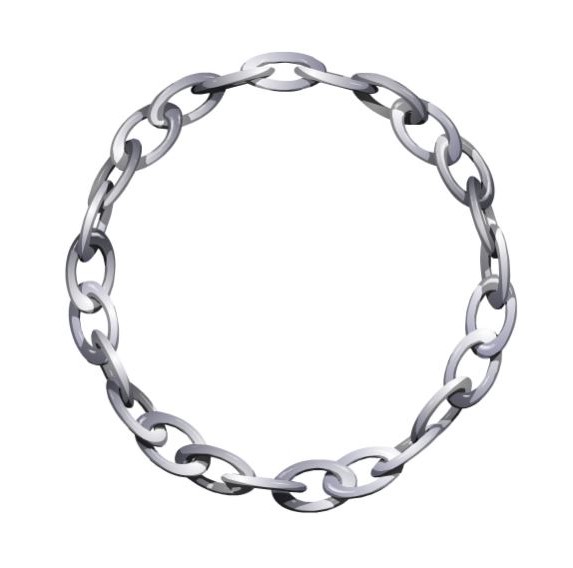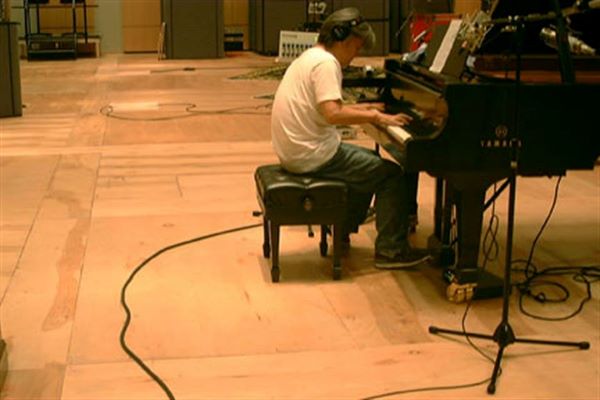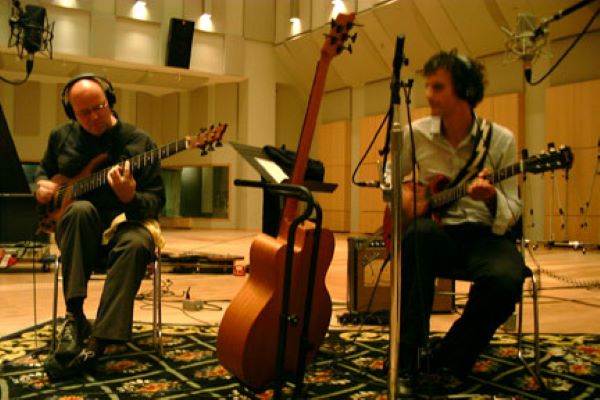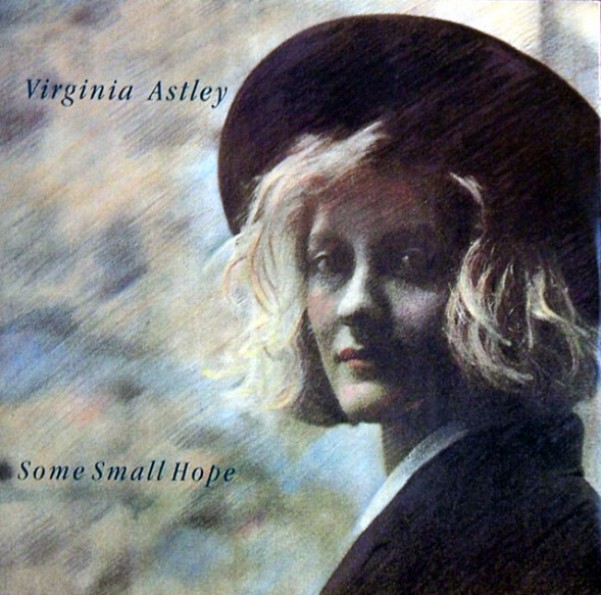The terrorist attack that took place on 9/11 in 2001 shook the world to its core. I’m certain we all remember where we were when we heard the news and saw the pictures from New York on TV. For Ryuichi Sakamoto the events were literally “close to home”. Just days after that devastating event he wrote a column in the Japanese newspaper Asahi Shimbun entitled ‘My Viewpoint’, which began:
‘Terrorism is an utterly cowardly, devious act. I wish to express my deepest condolences to all the people who have been affected by the terrorist attacks on September 11. I was shocked to the quick by this incident; it made me go weak in the knees. After hearing of the first attack, I couldn’t sit still, so I grabbed my camera and went out into the street. In a daze, I watched the Word Trade Center towers in flames, a sight too surrealistic to believe, no matter how much I stared at it.
‘There were many doctors and nurses assembled in front of the large downtown hospital, and a huge group of people had gathered to give blood. Just then, a WTC tower that had been standing until that moment disappeared with a huge roar, leaving only a hanging, black smoke. The thought crossed my mind that the black smoke probably contained not only asbestos, but also large amounts of numerous hazardous chemicals, including dioxin.’
It wasn’t only the events themselves that shocked Sakamoto. So too did the response of the leaders of both his adopted home and birth-country:
‘On TV, President Bush said, “This is a war.” Then, Prime Minister Koizumi made a statement supporting that position. But if there is retaliation, the general population including children will be the ones to be hurt, with nowhere to run…As the representative of a country that has a pacifist constitution, Prime Minister Koizumi is not supposed to support any acts of war…
‘…If the Prime Minister of Japan had expressed his opposition to a war on the grounds of the Japanese Constitution, and instead had offered to take on some sort of role as a go-between to achieve a peaceful resolution, this would have sent a big message to the world and would have spoken well of Japan. He has missed that splendid opportunity, but it is still not too late. This would not just be for Japan, but could also be a major contribution to the international community in the 21st century.
‘This is what I am thinking. Violence can only beget a chain of violence. Retaliation will only bring about new, atrocious acts of terrorism, directed not only at Americans but also at all the people of the world. The human race, which has come to possess huge destructive powers, must not open a Pandora’s box. I feel that to not retaliate may be the true valour here. President Bush! Who more than you can demonstrate the wisdom and the courage of the human race? You who can, all by yourself, mobilise the strongest power in the world?’
A final reflection was left hanging at the end of the piece. Sakamoto had noticed that there was no music at all in the city for three days. Then, ‘at around the 72-hour point when the possibility of there being survivors became slim, I started to hear songs in the streets. In Union Square, downtown, I heard young people singing ‘Yesterday’, and for some reason it eased my mind just a little bit. But there was a huge conflict churning inside me. It’s because the singing had started at the same time that resignation had set in. I had been observing its progress carefully. I absolutely disagree that music exists only to “heal” people; yet I am troubled by the question of whether, faced with someone who has been wounded, music can really do anything more than heal.’

On his website sitesakamoto.com, Ryuichi gathered input from many individuals on an interactive board headed debris of prayer. Clicking on a name amongst the criss-crossed pile of contributors gave access to a personal response to what had unfolded. Some, like David Torn, offered music; others, including Ryoji Ikeda, contributed visual images of hope. Most provided words. David Sylvian’s contribution read as follows:
‘I feel it’s important to counteract the intense negativity born out of fear, ignorance, anger and frustration with prayers for the dead, the suffering, and prayers for peace. To view this conflict as a fight between good and evil is enormously dangerous. To give in to the propaganda perpetrated by both sides of this conflict that perpetuates this sense of “otherness” where the “enemy” are concerned is to enable us to distance ourselves from the crimes against humanity executed in our names. Duality is an illusion. The spark of divinity resides in all beings.’
Sylvian accompanied his words with a quote from his guru, Mata Amritanandamayi:
‘If we look back through history, we can see that all conflicts and wars originate from the conflict within the individual. What is the real source of inner conflict? It is the lack of awareness of our true nature, the one living reality within us, of which we are all a part. And this is where spirituality, “the true religion” comes in: to awaken this awareness, and to help us develop such qualities as love, empathy, tolerance, patience and humility.’
Eighteen months later, as President Bush’s war on terror escalated, Sakamoto had found a small way for music to be relevant to the key issues of the day, beyond its healing powers in the aftermath of tragedy. ‘In March 2003, when the US invaded Iraq, I felt that I had to advocate peace over war, so I started this little web project…The idea is to chain musical pieces from one artist to another, like a chain letter. The purpose is to musically mark the passage of time that Iraq is in a state of war, to mark the steps to peace, to take each day that there is war and build a musical memorial to the desire for peace as well as to mark off the time of war…There are no rules how to contribute musically, except that the contributor must not eliminate any of the existing music as he or she adds to it, because the existing music is the result of the artistic contribution of the other artists.’ (2006)

David Sylvian was among the first group of artists approached, telling The Wire in June 2003, ‘We’re working on some music now that he calls “chain music”, which he’s sending around to a variety of different people to accompany the anti-war sentiment; and I’m right there with him. It is a challenge to take on this subject matter and not to give in to cliché and a certain amount of dogmatism. It is very challenging because it’s so easy to fail.’
That same month the first iteration was published on sitesakamoto.com with contributions from Ryuichi himself, Haruomi Hosono, Towa Tei, Ryoji Ikeda, Mika Vainio (Pan Sonic), Atom™, Carsten Nicolai and David Sylvian. The piece was then successively iterated by others over the coming months and years, as Sakamoto described it: ‘adding on to the existing work vertically as well as horizontally, overlaying or extending the existing creation.’
At each stage the developing protest composition was available to download, albeit initially in the very low mp3 quality that was then prevalent. Here is the 19 June 2003 original version of the track with the latest additions having been made by Mika of Pan Sonic:
In response to a cry of, ‘We don’t want your arms around the world’ – rejecting both the stranglehold of the global super-powers and their military arsenal – Sylvian’s highly distorted voice can be heard declaring:
‘World Citizens
We are today World Citizens
We are World Citizens today
We are World Citizens’
Sylvian explains the link between chain music and what would become the song ‘World Citizen’: ‘Ryuichi instigated the chain-music project. A chain letter in musical form, anti-war in origination. He originally asked me to write a set of lyrics for the project. Initially I felt apprehensive about taking on such weighty subject matter lyrically. In a very real sense this approach to lyric writing is the antithesis to my own. I also happened to be travelling at the time the request reached me so, reluctantly, I felt I had to turn it down. However, as the week wore on I found myself pacing the streets of London with the beginnings of an idea for a piece called ‘World Citizen’.
‘On my return to the US, I found the chain-music composition waiting for me. My immediate response to the piece was to repeat two lines at the heart of the composition, one of which was the phrase, “World Citizen”. The title resonated in a simple way. A necessary redirection of focus away from the national towards the global. That evening I penned the song ‘World Citizen’.’
Whilst Sylvian had overcome his reluctance to be involved with something so overtly political, Sakamoto was not now convinced. ‘I recorded a one-take demo a week later and sent an mp3 file to Ryuichi to see if, in his opinion, the piece was worth pursuing. The initial response was muted.’ Apparently Ryuichi was surprised by what he’d received. ‘It wasn’t what he was expecting; it was a bit full-on lyrically.’
‘A few days later Ryuichi said that he liked the concept of ‘World Citizen’ and wondered if we couldn’t write a more pop-orientated piece with the same title.’
Setting aside Sylvian’s demo, the pair then took a different path, exchanging files and starting to shape what would become a third piece on the theme – ‘World Citizen (I Won’t Be Disappointed)’.
‘It was at this time that Ryuichi called and suggested we record the version of ‘World Citizen’ I’d originally sent to him. We spent a week putting the piece together in New York with Skúli Sverrisson (Laurie Anderson) on bass, Amedeo Pace (Blonde Redhead) on guitar and Steve Jansen on drums. Ryuichi and I mixed the piece together in NY.’


Ultimately, the two different ‘World Citizen’ compositions would be released together, firstly on a Japan-only cd on Warner, then subsequently re-ordered and re-released on samadhisound. When the tracks were both complete, Sylvian commented that, ‘One is a very electronic-based piece of music, very much in keeping with what people might perceive as YMO’s kind of pop composition territory. The other piece is a little grungier, a little bit more rock based.’
So, why the change of heart on getting involved? ‘I felt that there was very little dissent being vocalised in the States. I thought, well, rather than putting something out that’s a little esoteric dig at what’s happening in the world right now, it just has to be straightforward. Put the facts out there. Tell it like it is, because we want to make people think a little more about what’s going on.’ (2005)
We first heard the song when it was performed as part of Sylvian’s A Fire in the Forest tour, his acoustic rhythm guitar accompanied only by Steve Jansen’s percussion. The lyric certainly gets straight to the point, immediately rejecting a world-view that values a human life in one country more highly than another, and railing against the inequality that means a child’s access to basic medicine is entirely dependent on the accident of place of birth and social class:
‘There goes one baby’s life
It’s such a small amount
She’s un-American
I guess it doesn’t count
Six thousand children’s lives
Were simply thrown away
Lost without medicine
Inside of thirty days’
Sylvian also picked up the cause of the Narmada Bachao Andolan, a social movement in India concerned with the social impacts of major dam construction across the river Narmada.
‘In Madhya Pradesh
Where they’re building dams
They’re displacing native people
From their homes and lands
So they hunger strike
‘Cos they believe they count
To lose a single life
Is such a small amount’
Activist Medha Patkar was appalled at the lack of consideration for local rural communities affected by the Sardar Sarover dam project and, through protests including threats to drown themselves and hunger strikes, her movement was initially successful in achieving the withdrawal of the World Bank and Indian Government from the scheme. However, when the lyric to ‘World Citizen’ was written, both the construction and the protests had restarted.
Sylvian has said that ‘Wonderful World’ was probably the first song he wrote with 9/11 in mind, but that was yet to be released so this was our first inkling of the impact of that devastating day on his songwriting during this period. Echoing the sentiment of his earlier debris of prayer entry, he’s not ready to accept a simple of argument of “good” against “evil”:
‘And the buildings fall
In a cloud of dust
And we ask ourselves
How could they hate us?
Well, when we live in ignorance and luxury
While our super powers practice
Puppet mastery
We raise the men
Who run the fascist states
And we sell them arms
So they maintain their place
We turn our backs
On the things they done
Their human rights record
And the guns they run’
The only way forward is to ‘do away with flags’, ’embrace the human spirit’ that unites us as citizens of the world, and ‘scream dissent out loud’. The song adopts the traditional anti-war proclamation: ‘Not one life is taken in my name’.
The songwriter was well aware that this would not be considered his most creative musicianship. ‘The exercise can feel rather artless, but art sometimes really isn’t the aim or the issue. I’m still not that enamoured of the protest song. I think music is far more powerful when it’s not being used a soapbox of some kind. Nevertheless, sometimes it’s simply not possible to remain silent.’ (2007)
Sylvian’s core ethos remained a belief in the power of music to move individuals, sparking a response that could change families, communities and ultimately the world. ‘I think that music has a far greater power… it works on far more profound and deeper levels than the political. I mean, yes, it’s important sometimes just to get up and say what needs to be said, if nobody else is saying it. But the power of music runs so much deeper; and in that sense, it’s a far greater political tool because it has the potential to change fundamentally the mind or the heart of the individual. That is the most profound political act you can make and I prefer to work on that level of profundity rather than voice openly political statements about this or that subject matter.’
For the cover of the samadhisound release of the ep, a painting by Atsushi Fukui was chosen – who had previously created the sleeve art for Blemish. Titled ‘spaceballs’ it calls to mind those photographs taken from orbiting spacecraft where the Earth is seen in a whole new context, land and sea both visible against the glowing lights of civilisation. Here though, what appears to be the Earth is elliptical in shape and displays the surface tension and fragility of a raindrop that at any moment could dissipate out of existence. It’s an arresting image which captures the precariousness of the world and life upon it.

The final update to the chain music project was made by Ryuichi Sakamoto in 2010, ahead of the withdrawal of US troops from Iraq the following year. By then the original piece had developed from a duration of six minutes to well over an hour, incorporating input from the likes of Christian Fennesz, Hector Zazou and Taylor Deupree. A second movement had even been added. Sakamoto’s sentiment remained consistent throughout: ‘Even though the 100,000-plus Iraqi civilian and the 3,000-plus US military lives lost to date can’t be brought back, I want to keep this project alive and open until the war has ended, until peace comes to Iraq’ (2006). In Madhya Pradesh late in 2019 Medha Patkar was once again on hunger strike, in protest against the authorities who were increasing water levels at the Sardar Sarover dam thereby threatening 190 villages with flooding.
‘World Citizen’
Steve Jansen – drums; Amedeo Pace – guitars; Ryuichi Sakamoto – keyboards; Skúli Sverrisson – bass; David Sylvian – vocals.
Music and lyrics by David Sylvian.
Produced by David Sylvian & Ryuichi Sakamoto. From World Citizen by David Sylvian & Ryuichi Sakamoto, Warner Music Japan, 2003. Re-released on samadhisound, 2004.
Recorded at Right Track recording studio a-509, New York/samadhi sound New Hampshire, 11-17 August 2003.
Lyrics © samadhisound publishing
‘Chain Music’ (June 2003)
Featuring: Ryoji Ikeda, Haruomi Hosono, Carsten Nicolai, Ryuichi Sakamoto, Uwe Schmidt as Atom™, David Sylvian, Towa Tei, Mika Vainio (Pan Sonic)
from sitesakamoto.com, 2003
Download links: ‘World Citizen’ (iTunes)
The final ‘chain music’ piece including David Sylvian’s contribution can be downloaded from Ryuichi Sakamoto’s website here (select ‘chain music i’).
Ryuichi Sakamoto’s photographs taken in the aftermath of 9/11, his essays on the subject and the debris of prayer interactive presentation can be accessed here.
The video of ‘World Citizen’ live is from the official samadhisound YouTube channel, recorded live in Verona, Italy on 4 October 2003. DV footage by Yuka Fujii for Osmosis.
Artist quotes are from interviews in 2003 unless otherwise stated. Full sources and acknowledgements for this article can be found here.
‘…there was so little dissent in the country during the build up to the war in Iraq, even in the New York Times. I was frightened by that. I wanted to write a song that would appeal to an American audience, that might even get some college radio play, and would have absolutely no ambivalence about it.’ David Sylvian, 2005


Thank you for helping me put this work in context. I always gain fresh insights from your posts. Again, thank you.
LikeLiked by 2 people
You are welcome, Doug. Thanks for reading.
LikeLiked by 1 person
“Who is David Sylvian?”
“David Sylvian is a Planet and Vista is painting him.”
(Tonight I had a dream with David Sylvian, and then another one.
Yes, your words enter deep and work inside)
LikeLiked by 2 people